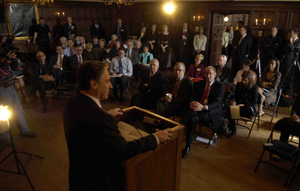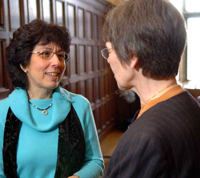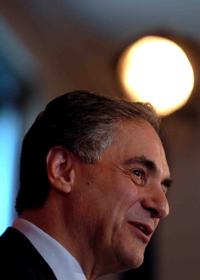|
||
      |
Features ::
Back to the future
Mathematician Robert J. Zimmer will return to the quads this July as Chicago’s next president. And it all adds up.
Like Hanna Holborn Gray (Yale), Hugo F. Sonnenschein (Princeton), and Don Michael Randel (Cornell), the University of Chicago’s next president comes to the job directly from the provost’s chair at an Ivy League institution. But unlike his predecessors, Robert J. Zimmer, currently provost and Ford Foundation professor at Brown University, is a scientist by education and experience. That fact, combined with 25 years as a Chicago mathematics professor and administrator—and a term as the University’s vice president for research and for Argonne National Laboratory—no doubt played a role in his election as the University’s 13th president.

President-elect Zimmer: Chicago’s future lies in its “singular
commitment to inquiry.”
In succeeding President Randel, who becomes head of the Andrew W. Mellon Foundation on July 1, Zimmer will be the third scientist to hold Chicago’s top post: mathematical physicist Max Mason was president from 1925 until 1928, and biologist and Nobel Laureate George S. Beadle served from 1961 until 1968. Mason roared through the pre-Depression 1920s, presiding over an $11 million fund-raising campaign as new facilities from the Divinity School to a 20,000-seat football stadium sprang up and more than 100 new faculty positions were created. Beadle arrived on the Hyde Park campus in the revolutionary ’60s, when the burning issues included the institution’s role in neighborhood renewal and how best to balance big-science, government-sponsored research with liberal education.
Plus ça change... Zimmer comes back to Chicago as the University nears the final quarter of its $2 billion Chicago Initiative and large-scale research facilities, undergraduate residence halls, a library addition, and an arts center are under construction and on the drawing boards. He returns as Chicago’s Center for Urban School Improvement prepares to open a third charter school and the University joins in a new $10 million program to promote neighborhood revitalization and affordable housing on the South Side. And he returns in the middle of an effort to retain Chicago’s management of Argonne National Laboratory, a Department of Energy contract it has held since the lab—with an anticipated FY07 operating budget of $492 million—was chartered in 1946 as an outgrowth of the Manhattan Project’s Metallurgical Laboratory.
But if challenges are evident, so are opportunities, and opportunity was the focus on Friday, March 10, when a smiling President Randel stepped briskly to the Ida Noyes Library podium a few minutes after the University Board of Trustees unanimously elected Zimmer as his successor. “It is a very happy day for me because it is a very happy day for the institution,” Randel told the assembly. In selecting Zimmer, he continued, the trustees had ensured the “smoothest of all possible transitions because there was a time...when music and mathematics were essentially the same science.” And, from working with Zimmer before he left for Brown, “I know at close hand how effective Bob will be.”
As chair of the faculty side of the trustee-faculty search committee, Robert Pippin, the Evelyn Stefansson Nef distinguished service professor in the Committee on Social Thought, the Department of Philosophy, and the College, seconded Randel’s sentiment. “Nobody is happier than the search committee that this day is here,” Pippin began. The search underscored “how important to the faculty of the University the president of the University is.” Along with an able administrator, “we want someone—we need someone—to be a representation of, and an advocate for, the academic values” of the institution. “After seven months of scouring the world we found the person who is exactly right...and we are immensely grateful that he accepted the challenge.”
“We are thrilled to be at this place,” concurred Board of Trustees chair Jim Crown, who chaired the trustees’ search committee. “The ultimate multitasking assignment,” the job of university president, he said, “is filled with internal contradictions. You want a leader who will take you someplace—but their job is also to be listener-in-chief. On this campus you need a distinguished scholar—yet at the same time you need someone who can balance the books and be a strong manager. You want somebody who understands the competitive set and the world we live in—yet at the same time having our values and having a good understanding of this institution requires real exposure and experience on this campus.” Finding somebody who met those insider-outsider needs was “indeed a challenge, but I’d like to introduce to you the person we found.”

Terese Zimmer chats with Carol Randel after the press conference.
As cameras clicked, Zimmer took the podium. It was, he began with a note of huskiness in his voice, “an extraordinary personal moment.” In 25 years as a Chicago faculty member and administrator, “like so many who have been here—faculty, students, postdocs, visitors—my work was fostered by the intense scholarly and educational environment. So I owe a great debt to the University of Chicago and am very pleased and honored at the opportunity to lead such a remarkable institution and to build on the work that Don Randel and so many others have done.”
To do so, he emphasized, means building on the institution’s “enduring values” and engaging “all sectors of the University community: trustees, faculty, students, staff, alumni, friends, and partners.” It is work he is eager to take on, he said, because Chicago’s “singular commitment to inquiry” is needed more than ever in an era of complex scientific, cultural, and societal issues: “These questions, of course, are not simple. They demand challenging argument, open debate, imaginative conceptualization, the class of ideas, and hard analysis. This is what the University of Chicago has always been committed to and has always done so well. It is the stimulating environment in which we have trained our students at all levels. And it is because of this environment, and the extraordinary contribution that have and will continue to grow out of it, that I am so pleased to be able to lead the University of Chicago in coming years.”
With that Zimmer opened the floor for questions. Asked about the insider-outsider synergy of his appointment, he emphasized his insider status. “As I said in my farewell address about four years ago,” he said to general chuckles, “the values of this particular university have stayed with me and really informed everything that I’ve done. I return to an environment in which I feel very natural, very comfortable, and one whose values I share.”
When queried about what he’d learned as provost at Brown, where he is credited with strengthening both research and teaching, he took the big-picture view: “It’s very interesting being someplace else. It’s the experience of being able to take an environment, a community—and understanding what its strengths, its values, and its assets are—and really being able to move that university forward.” On Chicago’s proper role in its neighborhood, he vowed to continue where President Randel leaves off: “The University cannot consider itself in isolation.” And asked about Argonne, he voiced optimism: “I look forward to seeing the University awarded the contract in this competition and to seeing the relationship build.”
The challenges are there, but like a long line of presidents before him, Zimmer is confident of Chicago’s opportunities.
Robert J. Zimmer: from A to Z
 AGE
58. Born November 5, 1947.
AGE
58. Born November 5, 1947.
CHICAGO CAREER PATH L. E. Dickson instructor of mathematics (1977–79); associate professor (1979–80); professor (1980–1996) and department chair (1991–95); associate provost for research and education (1995–98); Max Mason distinguished service professor (1996–2002); deputy provost for research (1998–2002); and vice president for research and Argonne National Laboratory (2001–02).
CURRENT POST Provost and Ford Foundation professor of mathematics, Brown University, Providence, Rhode Island.
EDUCATION AB, Brandeis University (1968); AM and PhD in mathematics, Harvard University (1971, 1975).
IN PRINT Two books—Ergodic Theory and Semisimple Groups (Birkhäuser, 1984) and Essential Results of Functional Analysis (Chicago, 1990)—and more than 80 articles. Past member, editorial boards of Ergodic Theory and Dynamical Systems, Transactions of the American Mathematical Society, Geometriae Dedicata, and Journal of Geometric Analysis; series editor, the Chicago Lectures in Mathematics Series.
INTELLECTUAL INTERESTS Ergodic theory, Lie groups, discrete subgroups, differential geometry, transformation groups, group representations, foliations, and related questions of geometry, group theory, and analysis.
OTHER ACADEMIC APPOINTMENTS Zimmer has taught at the U.S. Naval Academy (1975–77) and at the University of California, Berkeley (1981–83), and has held visiting positions at Harvard and institutions in Israel, France, Australia, Switzerland, and Italy.
RECOGNITION Recipient of an Alfred P. Sloan Foundation fellowship (1978–83), he served on the National Research Council’s Board of Mathematical Sciences (1992–95) and its executive committee (1993–95).
THE WHY OF MATHEMATICS “I actually started college as a physics major,” Zimmer, an alum of New York City’s Stuyvesant High, confessed at an Einstein lecture series in March 2005. “I switched to mathematics when I tried unsuccessfully for 45 minutes to get an oscilloscope to show a sine wave.”
ZIMMER PATERFAMILIAS Married to Terese S. Zimmer, a PhD in political science who works with Brown’s Educational Alliance, evaluating professional-development programs for public-school teachers. Three sons: David, U-High’00, a Harvard grad doing international development work in Sierra Leone, enters a four-year JD/AM public-policy program at Harvard this fall; Benjamin, U-High’03, is a Harvard junior majoring in history; Alex is a high-school freshman.